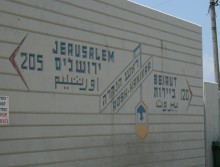
Violence in Lebanon can reach Israel. Sign showing the distance between Jerusalem and Lebanese capital city. Illustrative. By Joshua Spurlock
The last time Lebanon lacked a president for any length of time, armed violence reached the Lebanese capital and ultimately led to a resurgence in political power by the Hezbollah terrorist group. So it’s not surprising that the US and France are watching Lebanon after that nation’s last president ended his term without a replacement.
The Daily Star reported that French President François Hollande shared concern about the situation, which came after political gridlock in Lebanon’s parliament prevented a new president from being elected. The two main political alliances, one led by Hezbollah and one more pro-West and anti-Syrian, remain at odds over who should lead the country next. Hezbollah’s coalition has been particularly disruptive to the process.
On Friday (May 23), spokesperson Marie Harf told reporters the American ambassador to Lebanon is already involved.
“It’s certainly part of our engagement with the different parties and leaders to try and get to a political solution here,” Harf was quoted as saying in a State Department press release. “That’s in the best interest of the Lebanese people. That’s certainly been a key part of what the ambassador’s been doing there.”
With Syria having spiraled out of control and already touching Lebanon, there remains a risk that Lebanon could implode into its own conflict.
And now a lengthy power vacuum in Lebanon could exacerbate political tensions and encourage more drastic steps by groups to take control—especially if it appears like it could influence Lebanon’s involvement with the Syrian civil war. Violence in Lebanon has already been instigated by Lebanese fighting other Lebanese over choosing sides in Syria.
That raises questions about the possibility of intensified fighting breaking out in Lebanon over the Syrian conflict or efforts by Hezbollah to take power in Lebanon. That could even turn into an opportunity for radicals to try and drag Israel into such a fight to either act as a scapegoat for Hezbollah to rally the people behind—or to increase the pressure on Hezbollah by instigating Israeli attacks.
More fights in the Middle East mean a greater likelihood of terrorists taking advantage and training or acquiring weapons to use against the West, not to mention a likely increase in oil prices.
In other words, it’s not just the French and the Americans who should be concerned about Lebanon’s presidency.
(By Joshua Spurlock, www.themideastupdate.com, May 25, 2014)
